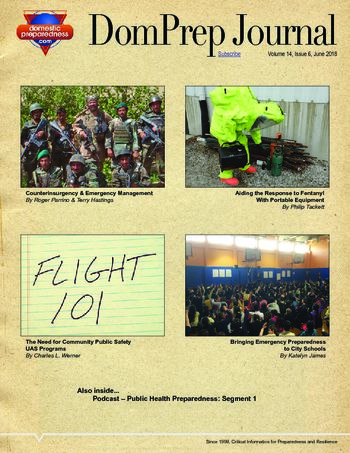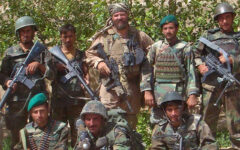

Leveraging Learning & Teaching Opportunities
Catherine L. Feinman
June 27, 2018
Each day, there are opportunities to acquire new knowledge and skills as well as opportunities to share current knowledge and skills with others. This is especially true in the emergency

Bringing Emergency Preparedness to City Schools
Katelyn James
June 20, 2018
The National Oceanic Atmospheric Administration (NOAA) is predicting a near-normal 2018 Atlantic
hurricane season: the formation of 10-16 named storms, with 5-9 becoming hurricanes (1-4 of these
potentially becoming major hurricanes). For the past 10 years, the New York City (NYC) Emergency
Management Department has been educating children in NYC schools through the Ready New York Kids
Program. Each presentation focuses on three key messages: make a plan, get supplies, and prepare a Go
Bag.

The Need for Community Public Safety UAS Programs
Charles L. Werner
June 20, 2018
Unmanned aircraft systems (UAS/drones) offer great value for public safety, with support and guidance needed at the local, state, and national levels when considering such systems. UAS offer a profound new view and situational awareness of significant incidents, events, and disasters. This article describes the value of UAS and provides guidance for jurisdictions considering implementing UAS programs.

Aiding the Response to Fentanyl With Portable Equipment
Philip Tackett
June 13, 2018
Illegal manufacturing of fentanyl continues to rise and, with it, the dangers of clandestine drug laboratories to responders. Dangerous crime scenes like these are not limited to any one location. Responders everywhere need to prepare to encounter them at any point. Portable gas chromatography mass spectrometry (GC/MS) equipment can help hazardous materials (hazmat) response teams quickly identify white powders, like fentanyl, and associated cutting agents on-scene.

Counterinsurgency & Emergency Management
Roger Parrino and Terry Hastings
June 6, 2018
Counterinsurgency and emergency management are two seemingly unrelated concepts, yet they have a lot in common in terms of the strategies necessary to succeed. In each case, empowerment is the ultimate key to success. For counterinsurgency, it is about empowering the host country and, for emergency management, it is about empowering local jurisdictions. Although empowerment is the central theme, the strategies to achieve empowerment include diplomacy, relationship building, and trust.

